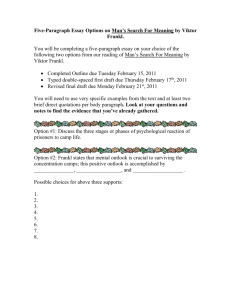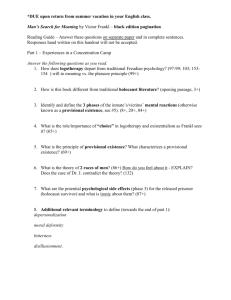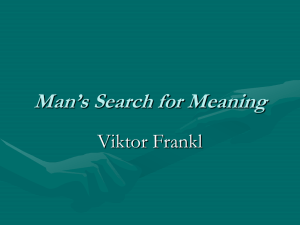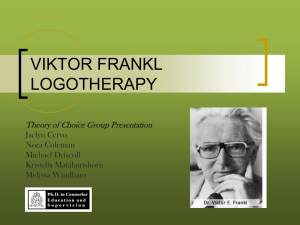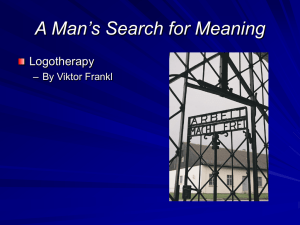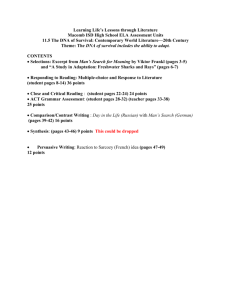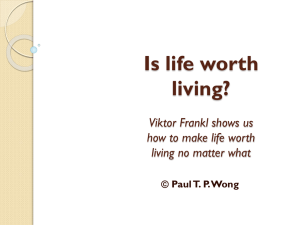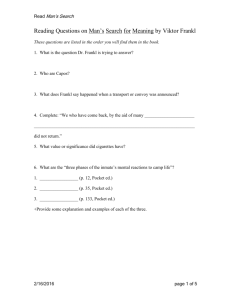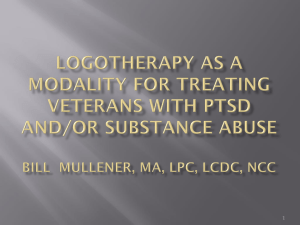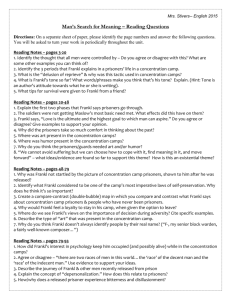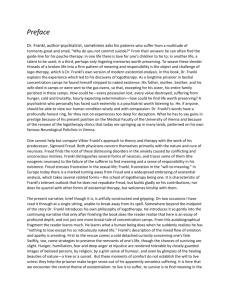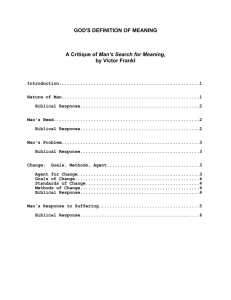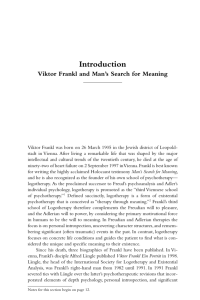Brian Lanahan (Blanahan@aol
advertisement
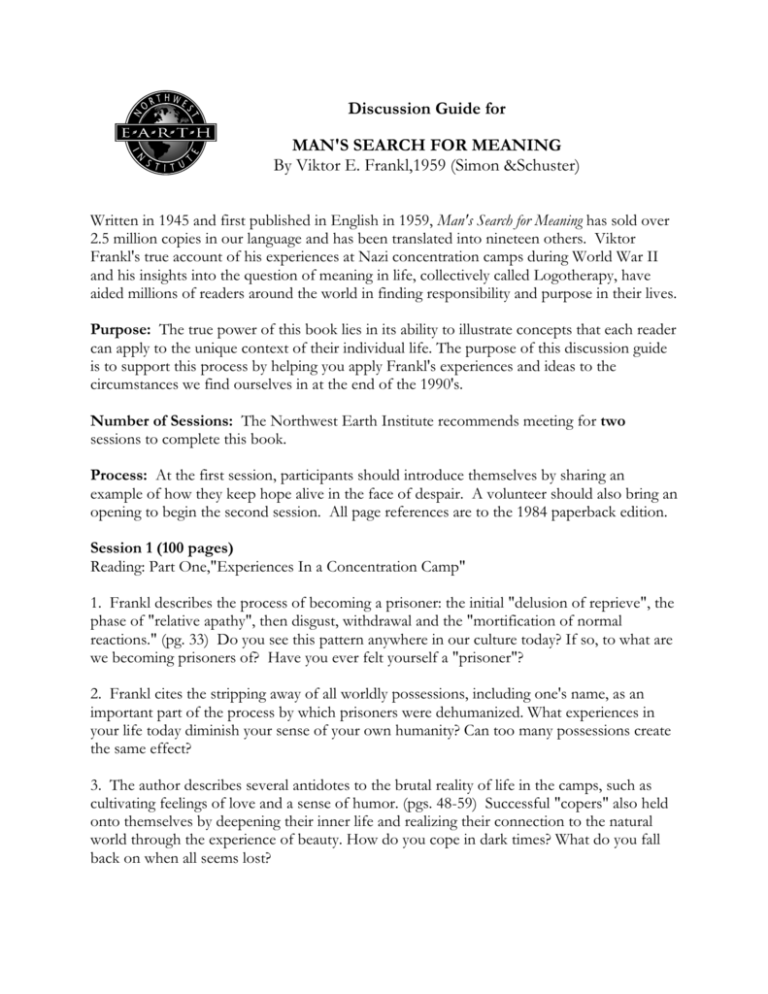
Discussion Guide for MAN'S SEARCH FOR MEANING By Viktor E. Frankl,1959 (Simon &Schuster) Written in 1945 and first published in English in 1959, Man's Search for Meaning has sold over 2.5 million copies in our language and has been translated into nineteen others. Viktor Frankl's true account of his experiences at Nazi concentration camps during World War II and his insights into the question of meaning in life, collectively called Logotherapy, have aided millions of readers around the world in finding responsibility and purpose in their lives. Purpose: The true power of this book lies in its ability to illustrate concepts that each reader can apply to the unique context of their individual life. The purpose of this discussion guide is to support this process by helping you apply Frankl's experiences and ideas to the circumstances we find ourselves in at the end of the 1990's. Number of Sessions: The Northwest Earth Institute recommends meeting for two sessions to complete this book. Process: At the first session, participants should introduce themselves by sharing an example of how they keep hope alive in the face of despair. A volunteer should also bring an opening to begin the second session. All page references are to the 1984 paperback edition. Session 1 (100 pages) Reading: Part One,"Experiences In a Concentration Camp" 1. Frankl describes the process of becoming a prisoner: the initial "delusion of reprieve", the phase of "relative apathy", then disgust, withdrawal and the "mortification of normal reactions." (pg. 33) Do you see this pattern anywhere in our culture today? If so, to what are we becoming prisoners of? Have you ever felt yourself a "prisoner"? 2. Frankl cites the stripping away of all worldly possessions, including one's name, as an important part of the process by which prisoners were dehumanized. What experiences in your life today diminish your sense of your own humanity? Can too many possessions create the same effect? 3. The author describes several antidotes to the brutal reality of life in the camps, such as cultivating feelings of love and a sense of humor. (pgs. 48-59) Successful "copers" also held onto themselves by deepening their inner life and realizing their connection to the natural world through the experience of beauty. How do you cope in dark times? What do you fall back on when all seems lost? 4. One dying woman found solace in a chestnut tree outside her window: "I am here- I am here- I am life, eternal life." (pg. 78) Have you ever felt spoken to by nature? 5. On page 79 the author introduces the concept of "provisional existence", or life without a sense of future. It has been said that we are the first people in human history who must live with the knowledge that there may not be generations after us due to the prevailing threat of nuclear and environmental disaster. Do you see signs of "provisional existence " in our society today? How do we combat it? 6. Frankl speaks of the last of the human freedoms--"to choose one's attitude in any given set of circumstances, to choose one's own way" (Pg.75). Discuss times in your life you have exercised this freedom and/or opportunities you now have to do so. 7. On page 85 Frankl proposes a radical shift in our concept of meaning in life, "it did not really matter what we expected from life, but rather what life expected from us." Discuss this view of life; how does it sit with you? How can we know what life is asking of us? Session 2 ( 51 pages) Reading: Part Two, "Logotherapy in a Nutshell" Part Three, "The Case for a Tragic Optimism" 1. Frankl states that the central tenet of Logotherapy is that our main concern is not to gain pleasure or avoid pain but to see a meaning in our life. Evaluate this "will to meaning" in your own life. Has it been a driving force? How has it manifested? 2. Our culture seems to be obsessed with relieving stress, and yet Frankl asserts that what we actually need is "not a tensionless state but rather the striving and struggling for a worthwhile goal, a freely chosen task." (pg. 110) Examine this contradiction. 3. In discussing the existential vacuum (pg. 111) Frankl notes a number of individual and societal symptoms associated with a frustrated will to meaning, including an overriding sense of boredom, and compensatory obsessions with power, money, pleasure etc... How accurately does this describe our culture today? Are the symptoms getting better or worse? What factors are behind this change? 4. In this section the author reiterates his earlier assertion that meaning in life is not an abstraction, but rather "the specific meaning of a person's life at a given moment". He asserts that we can only know the big meaning of our life in retrospect - at it's end, and that this will be dependent on all the little moments of actualized meaning along the way. What do you think of this "film" model of life? Is Frankl arguing against overarching principles in the search for meaning? 5. Evaluate Frankl's notion of the relationship between freedom and responsibility in light of life's essential transitory nature. What matters in the midst of all this impermanence? 03/03/16 6. Frankl speaks of everyone having a unique mission to fulfill in life, but warns that "selfactualization is possible only as a side effect of self-transcendence." (pg. 115) What does he mean by this? What does this say to our traditional notions of "making a difference", and of our need for fame? What does it say about our relationship to the Earth? 7. Logotherapy asserts that we can discover meaning in life via three different ways: 1) By creating a work or doing a deed. 2) By experiencing something or encountering someone. 3) By the attitude we take toward unavoidable suffering. Which of these three "ways" has worked for you? Have you experienced other ways of finding meaning? 8. Frankl asserts that the intrinsic value in human life lies in our ability to actualize meaning in any circumstance, and that doing so gives us dignity. (pg. 151) What might a society that valued dignity over usefulness look like? How might its economy run? How would it's citizens relate to each other and to other life forms? Can an animal have dignity? 9. If Frankl were writing an update to this book today, what would he say? 10. What's up with you at the end of this book? What questions remain unanswered? How will you plug it into your life? 03/03/16
